MONDAY'S SCRIPT TIP:
WHAT'S YOUR POINT?
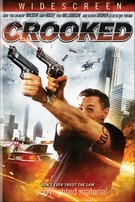
A dozen years ago at this time I had 2 news films come out on DVD one with Steven Seagal and one without. The one without was CROOKED - a film that began as a spec script of mine called SOFT TARGET that was almost set up at a studio once... oddly enough, the same studio where they screened the film. The script went through *many* changes on the way to the screen - and went from what have been a good example to a bad example.
Every story worth telling has a point.
Recently I was telling a friend about a frustrating experience at
the Post Office. I had my scripts sealed in a mailer with an
address label, and had the money in my hand to pay for the
postage. I was waiting behind a woman who had the items she was
going to mail, but no envelope, no address label, and no pen to
write with. She was completely disorganized, and it brought the
line to a stand-still. It was very frustrating... but the story
was more than just an incident from my day, it had a pretty
obvious point: Plan ahead and you won't waste time. Next time
you're telling someone a story about your day, look for the
point. The reason WHY you wanted to tell this story. There will
be one!
I think what makes a film stick to the brain is the theme. I
also think that every story has a theme in there somewhere. But
will you EXPLORE that theme or IGNORE it? Lately Hollywood films
have been ignoring theme and making junk food movies... I thought Hollywood
might change in this post World Trade Center world - I'm looking at my
priorities differently today than before September 11th. Will
producers wake up and realize that it's not all about money, it's about
telling stories that touch people's lives? Those stories can
still be entertaining (we need entertainment) but they must also
have substance. In this post 9-11 world, where it's hard to find
someone to trust, I want the the audience to trust movies.
Trust movies to transport them to a safe place for two hours.
They need to have a THEME. Be something more that just disposable entertainment.
What is a theme? It's what your film is really about - the
POINT rather than the plot. The moral of the story. I think
theme is the most important part of a script. I think that the
whole darned script comes from theme.
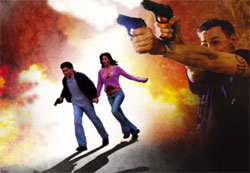
In my book
Secrets Of
Action Screenwriting I used DIE HARD as an example of theme.
I used REAR WINDOW as an example of theme when I spoke at Santa
Fe Screenwriters Conference, NORTH BY NORTHWEST when I spoke at
Las Vegas Screenwriters Conference, THE MATRIX when I spoke in
London a few years ago, I used LIAR LIAR as my main example in
an article in Script Magazine a couple of years ago, and I've used ALIENS and
AMERICAN PIE 2 and FACE/OFF and many other films in
previous Script Tips. None of those are the kind of deeply
symbolic art films discussed by the black beret crowd in Berkeley
coffee shops and largely ignored by 95% of American movie goers.
Fairy tales have themes, nursery rhymes have themes, so why
shouldn't movies? Why can't an ENTERTAINMENT film also be a GOOD
film? Movies in the "golden age of Hollywood" always had a
point... plus sword fighting and pirate ship battles. Why can't
the films of today be meaningful as well as entertaining?
Theme also is the key to character. It's the doorway to exploring character in your story because each character now contains an element of your story's theme - like a subtext. One of the things I do in the big 2 day class is start with an idea, find the theme in that idea, then find the characters which illustrate aspects of that theme, so that we can get deeper into character... and explore the theme just by having the character show up.
THEME TO BREAK STORY
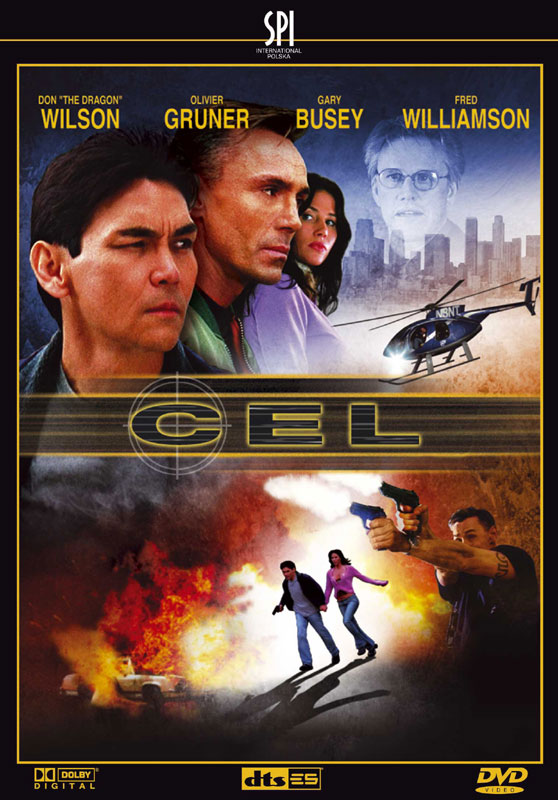
My 18th film came out a couple of years ago... I'm sorry if you've seen it. The original script for CROOKED was about a top secret hitman who can
get past police protection to assassinate witnesses against the mob.
One person has seen the hitman's face and lived - a woman. The reason
why this hitman can bypass police? He's a detective. So the police
department grabs their two most trustworthy detectives to find the
woman and take her *somewhere* (don't tell us where) and when the
beeper goes off, take her to the grand jury to identify the hitman. They pick a random motel
and WHAM! they are attacked. So the big question becomes - who can you
trust? And that's where my theme came from. In this post 9-11 world, we are having
trouble trusting people. Can we ever trust again? We must trust, in order to survive...
So I wrote a script about that... with explosions and car chases. Every character has a
*story purpose* (like the chief of detectives or a minor assassin disguised
as a hotel maid) but they also have a *theme purpose*, too - and that
provides character and subtext and secretly explores my theme without the audiemce noticing.
Well, except for the perceptive ones.
So here's how I came up with my characters...
What traits make you *not* trust someone?
Can you trust someone who never shows their emotions? (Latimer)
Can you trust someone who turns everything into a joke? (Yordan>
Can you trust someone who is more intelligent than you are? (Lynn)
Can you trust someone who is really moody? (Buzz)
Can you trust someone who has serious substance abuse problems? (Dratler)
Can you trust someone who is too slick?
Can you trust someone who always agrees with you?
Can you trust someone who is...
Each of these theme traits are great doorways into character. And they
are ways to show the differences in character, ways that will pop up
again and again in the script (because the story keeps putting
characters in situations where they must trust each other to
survive... and situations where they can't trust each other).
The hit teams all came from the theme, too - who can you trust? What
traits make you trust someone? If a Maid knocked
on your motel room door, would you let her in? In Los Angeles, would you
find tourists milling around your motel lobby unusual? I tried to make every
hit team a *surprise* to the audience (and the characters). You would never
expect these people to be killers! Unexpected not only makes the story more
exciting and unpredictable, it's theme in action! I had a lot of fun creating "invisible"
hit teams - like the bad actor and the heavily armed toursist couple. It all comes back t
o the theme! Trust - who would you trust, who wouldn't you trust?
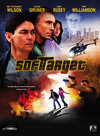
Once you have the theme traits, you need to think about what kind of
person has these traits and how they came to have them. You're
creating a backstory for the characters and that backstory will have
other character elements - say, some guy who was in the military where
he learned how to go along to get along or some guy who was in an
abusive home and learned to hide his emotions or some guy who... well,
you get the idea. We're coming up with backstory that fits the theme
trait and gives us other traits that define the character.
Now you want to look at how characters talk - everyone has a different
vocabulary. Different pet phrases. Hey, some of these pet phrases may have
something to do with theme! Again, we're using theme to explore character *and*
explore story *and* take a look at society (in a world where it's hard to find someone
to trust, post 9/11). I wrote an article for Script Magazine about theme hidden in dialogue
that used MINORITY REPORT as an example... If there are a dozen words that mean the
same thing, why not use the one that is thematic?
Now you want to look at actions and reactions - everyone has a
different method for solving problems or dealing with problems. Again, these are thematic,
and also *show* character through actions. You aren't sending a message by Western Union,
you are using the story itself and all of the parts of the story. The actions can demonstrate theme! In
my tip on writ8ing my BLACK THUNDER flick for Showtime, I look at theme in *action scenes*!
Nobody ever thinks that a shoot out is a "message scene".
Now you want to look at the character's world view - everyone sees the world
through their past experiences.
Now you want to look at the way they process information - everyone
has a different type of "mental filing cabinet".
Once you know your characters, they start talking to you in their own
voices and you can see the world as they see it (rather than as you
see it), and they all become individuals - their own persons.

Now we have three dimensional characters who are helping us explore the theme - we're going to
look at trust in our modern times and why we need to trust others instead of lock the doors to our lives
and trust no one. Because the story for CROOKED places our characters in a world where they really
can't trust others... and they maybe can't even trust themselves (what if they *accidentally* gave
information to a friend who ends up being the bad detective?) we can look at how hard it is to trust
someone these days but how important it is to trust people... because we can't go it alone. We can't
just isolate ourselves from the world and still have a life. If we're going to survive as a society we have
to work together... and that means we have to trust people. Sometimes we have to trust strangers...
and that's my point. My theme.
Even dopey action movies have a point.
All of this starts with us - the screenwriters. If we're just
writing a script for money, no one will care about it. If we're
just writing a script to preach a sermon, no one will see it. We
need to write entertaining scripts which are meaningful, too. We
need to *explore* our theme through the story and characters,
not through speeches and heavy handed scenes.
Look at your current script and ask yourself: What's the
point? How will this script make a positive impact on the
world?
We can make the world a better place. Write scripts that *mean something*.
Of course, the script went through some changes on the way to the screen...
More on this in the Story Blue Book.
BRAND NEW!
How Do I do That?

101 SCREENWRITING ANSWERS Blue Book!
New to screenwriting? You probably have questions! How do I get an Agent? How do I write a phone conversation? Do I need a Mentor? What’s does VO and OC and OS mean? What is proper screenplay format? Should I use a pen name? Do I need to movie to Hollywood? What’s the difference between a Producer and a Production Manager, and which should I sell my script to? How do I write a Text Message? Should I Copyright or WGA register my script? Can I Direct or Star? How do I write an Improvised scene? Overcoming Writer’s Block? How do I write a Sex Scene? And many many more! This book has the answers to the 101 Most Asked Questions from new screenwriters! Everything you need to know to begin writing your screenplay!
All of the answers you need to know, from a working professional screenwriter with 20 produced films and a new movie made for a major streaming service in 2023!
Only $4.99
NEWEST AND BLUEST!
Want To Look Like An Expert?

RESEARCH & WORLD BUILDING Blue Book!
Does this gun fire 6 shots or only 5? In all of the excitement of writing your action scene, you might not have done the research... and your hero could be out of ammo! Whether you are writing a novel or screenplay, you can save your hero, and your story, by doing a little research first! This book looks at Why you should research, Whether you should research First or Later, PLUS the importance of World Building in Science Fiction, Fantasy... and the worlds you explore in every other genre. Movies like JOHN WICK and THE GODFATHER take place in their own unique worlds... and writers must create them! YOU are the technical advisor on your Screenplay or Novel.
Using movie examples like TOP GUN, HUNT FOR RED OCTOBER, BLUE CRUSH, ADVENTURE LAND, several of my produced films, JOHN WICK, the novels of Donald E. Westlake and Thomas B. Dewey, SPY KIDS, the LORD OF THE RINGS movies, SOYLENT GREEN (which takes place in the far off future of 2022), and many others we will look at researching stories and creating worlds. The 8 Types Of Research, the 10 Types Of Information To Look For, 12 Important Elements Of World Building. Plus chapters on How To Rob A Bank and Commit Murder And Get Away With It for those of you interested in crime fiction, and Researching The Future for those writing science fiction, and Levels Of Reality if you are writing about a version of the real world.
No matter what you are writing, this book will help you find the facts... or make them up in a convincing way!
Only $4.99
NO KINDLE REQUIRED! Get the *free* app (any device, except your Mr. Coffee) on the order page on Amazon!
FINISHED WRITING?
All About Rewrites!
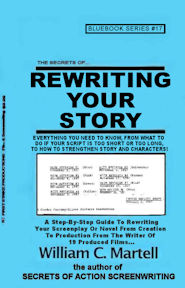
REWRITES Blue Book!
Rewriting In Waves?
When You Finish Your Screenplay Or Novel...
The Rewrites Begin!
The end is just the beginning! You’ve finished your story, but now the rewriting begins! This 405 page book shows you how to rewrite your screenplay or novel to perfection. Everything from Character Consistency to Shoeboxing to How To Give And Receive Notes to 15 Solutions If Your Script’s Too Long! and 15 Solutions If Your Script’s Too Short! to Finding The Cause Of A Story Problem to Good Notes Vs. Bad Notes to Finding Beta Readers to Avoiding Predictability to Learning To Be Objective About Your Work to Script Killer Notes and Notes From Idiots to Production Rewrites and What The Page Colors Mean? and a Complete Rewrite Checklist! The complete book on Rewriting Your Story!
Only $4.99
NEW ISH!
All About Endings!
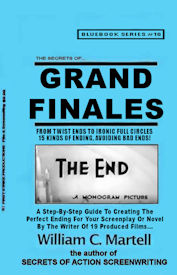
GRAND FINALES Blue Book!
The Perfect Ending For Your Story!
The First Ten Pages Of Your Screenplay Are Critical,
But What About The Last 10 Pages?
Creating the perfect ending to your story! This 100,000 word book shows you how to end your story with a bang, rather than a whimper. Everything from Resolution Order to Act Three Tools to Happy or Sad Endings? to How The Beginning Of Your Story Has Clues To The Ending (in case you were having trouble figuring out how the story should end) to Falling Action to How To Avoid Bad Endings to Writing The Perfect Twist Ending to Setting Up Sequels & Series to Emotional Resolutions to How To Write Post Credit Sequences to Avoiding Deus Ex Machinas, to 20 Different Types Of Ends (and how to write them) and much more! Everything about endings for your screenplay or novel!
Only: $4.99
NO KINDLE REQUIRED! Get the *free* app (any device, except your Mr. Coffee) on the order page on Amazon!
SHRINKING IT DOWN
All About LOGLINES, TREATMENTS, and PITCHING!
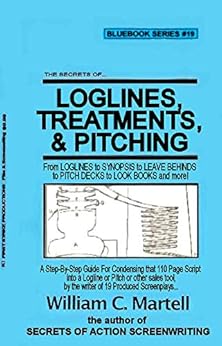
LOGLINES, TREATMENTS, and PITCHING! Blue Book!
Distilling Your Screenplay!
Loglines, Treatments, Pitching, Look Books, Pitch Decks, One Pagers, Rip-O-Matics?
You have written a brilliant 110 page screenplay, but how do you get anyone to read it? You need to distill it down into some form of verbal moonshine or story rocket fuel that will ignite that bored development executive or manager or agent and get them to request your screenplay. But how do you shrink those 110 pages into a 25 word logline or a 2 minute elevator pitch or a one page synopsis or a short paragraph? This 100,000 word book shows you how! Everything you need to know! From common logline mistakes (and how to solve them) to how your pitch can reveal story problems to the 4 types of pitches!
272 Pages - ONLY $4.99!
NEW in 2020!
Making Your Own Movie?
WRITE IT: FILM IT BOOK!

Making Your Own Movie?
Writing An Indie Film?
Writing A Low Budget Genre Script To Sell?
Writing A Made For TV Holiday Movie?
You will be writing for BUDGET. On a standard spec screenplay, you don’t have to think about budget, but these types of screenplays writing with budget in mind is critical!
If you are making your own movie, budget, is even more important - and you need to think about budget *before* you write your screenplay... or you will end up with a script that you can’t afford to make (or is a struggle to make). Everyone is making their own films these days, and even if you have done it before there are lots of great techniques in this book to get more money on screen - for less money! You can make a film that looks like it cost millions for pocket change.
344 Pages - ONLY: $7.99!
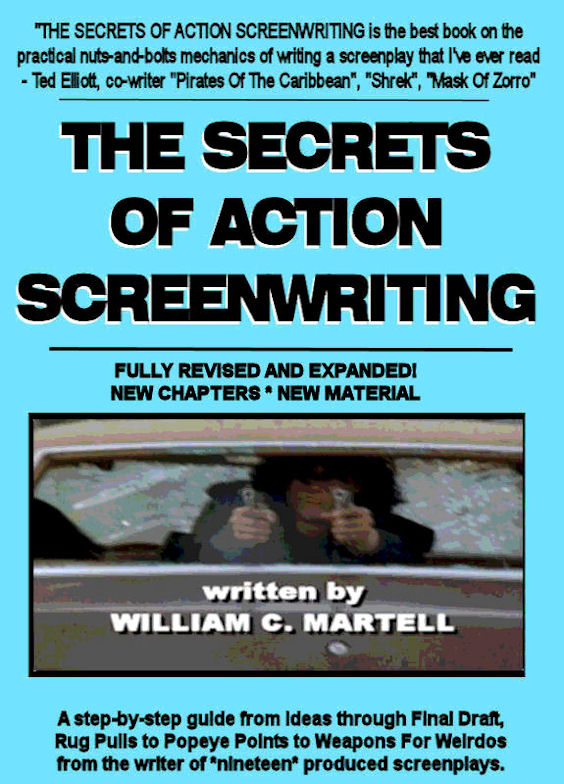
THE BOOK THAT STARTED IT ALL!
*** THE SECRETS OF ACTION SCREENWRITING *** - For Kindle!
*** THE SECRETS OF ACTION SCREENWRITING *** - For Nook!
Why pay $510 for a used version of the 240 page 2000 version that used to retail for $21.95? (check it out!) when
you can get the NEW EXPANDED VERSION - over 500 pages - for just $9.99? New chapters, New examples, New techniques!
"SECRETS OF ACTION SCREENWRITING is the
best book on the practical nuts-and-bolts mechanics of writing a screenplay I've ever read."
- Ted Elliott, co-writer of MASK OF ZORRO, SHREK, PIRATES OF THE CARIBBEAN and the sequels (with Terry Rossio). (ie; 4 of the top 20 Box Office Hits Of ALL TIME.)
Only $9.99 - and no postage!
BRAND NEW!
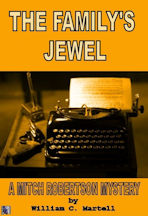
***
MITCH ROBERTSON #2: THE FAMILY'S JEWEL *** - For Kindle!
"The Presidential Suite of the Hollywood Hoover Hotel looked like a bloody battlefield: bodies everywhere, furniture broken, red liquid dripping from the walls, dead soldiers littering the elegant Berber rug as clouds of smoke overhead bounced between two air conditioning vents.
Mitch Robertson stepped over the body of an ex-child star turned sex tape star turned pop star and entered the room, spotted a gun on the floor and picked it up... careful not to spill his coffee with three pumps of mocha syrup from Penny’s Coffee Shop. That coffee was gold, the only thing keeping him going in this dazed state of wakefulness. The gun felt light. Holding it, he saw the silhouette of an 80s action star sitting sideways on a tipped over chair. Motionless. Was he dead? Mitch was still hung over from the Awards Party the night before, and wondered whether this was all some sort of crazy nightmare that he would wake up from... but when he tripped over the brown legs of a bottomless Superhero, flaccid junk encased in a condom but still wearing his mask, and hit the edge of the sofa, gun skittering and coffee spilling, he realized that it was all very real. What the hell had happened here?"
Short Novel. Only 99 cents! - and no postage!
Tips FAQ

My New Script Secrets Newsletter!

THE BLUE BOOKS!
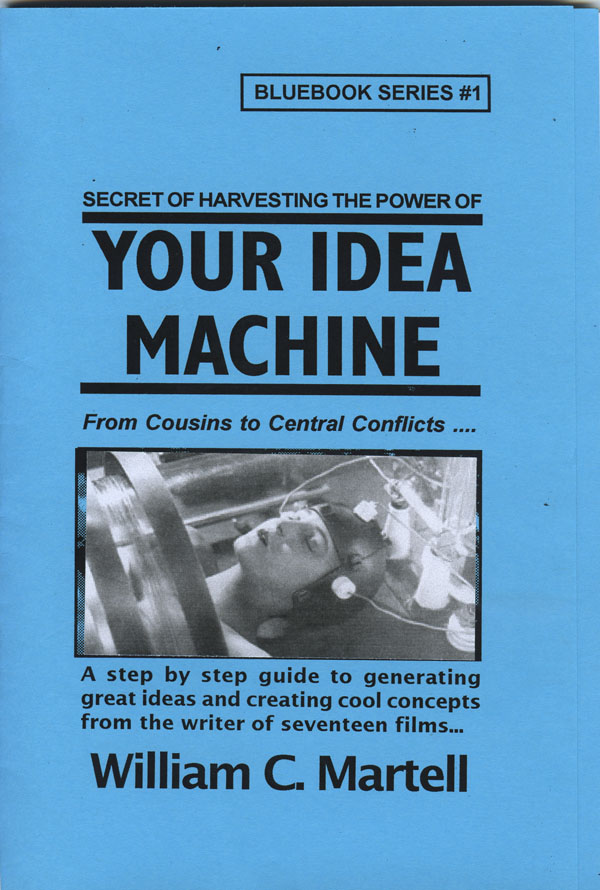
FIND A GREAT IDEA!
*** YOUR IDEA MACHINE *** - For Kindle!
****
Expanded version with more ways to find great ideas! Your screenplay is going to begin with an idea. There are good ideas and bad ideas and commercial ideas and personal ideas. But where do you find ideas in the first place? This handbook explores different methods for finding or generating ideas, and combining those ideas into concepts that sell. The Idea Bank, Fifteen Places To Find Ideas, Good Ideas And Bad Ideas, Ideas From Locations And Elements, Keeping Track Of Your Ideas, Idea Theft - What Can You Do? Weird Ways To Connect Ideas, Combing Ideas To Create Concepts, High Concepts - What Are They? Creating The Killer Concept, Substitution - Lion Tamers & Hitmen, Creating Blockbuster Concepts, Magnification And The Matrix, Conflict Within Concept, Concepts With Visual Conflict, Avoiding Episodic Concepts, much more! Print version is 48 pages, Kindle version is over 175 pages!
Only $4.99 - and no postage!
FIGURE OUT YOUR STORY!
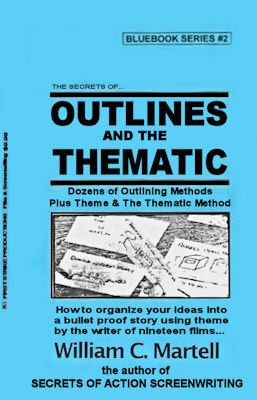
OUTLINES & THE THEMATIC Blue Book.
ARE YOUR SCENES IN THE RIGHT ORDER?
AND ARE THEY THE RIGHT SCENES?
Your story is like a road trip... but where are you going? What's the best route to get there? What are the best sights to see along the way? Just as you plan a vacation instead of just jump in the car and start driving, it's a good idea to plan your story. An artist does sketches before breaking out the oils, so why shouldn't a writer do the same? This Blue Book looks at various outlining methods used by professional screenwriters like Wesley Strick, Paul Schrader, John August, and others... as well as a guest chapter on novel outlines. Plus a whole section on the Thematic Method of generating scenes and characters and other elements that will be part of your outline. The three stages of writing are: Pre-writing, Writing, and Rewriting... this book looks at that first stage and how to use it to improve your screenplays and novels.
Only $4.99 - and no postage!
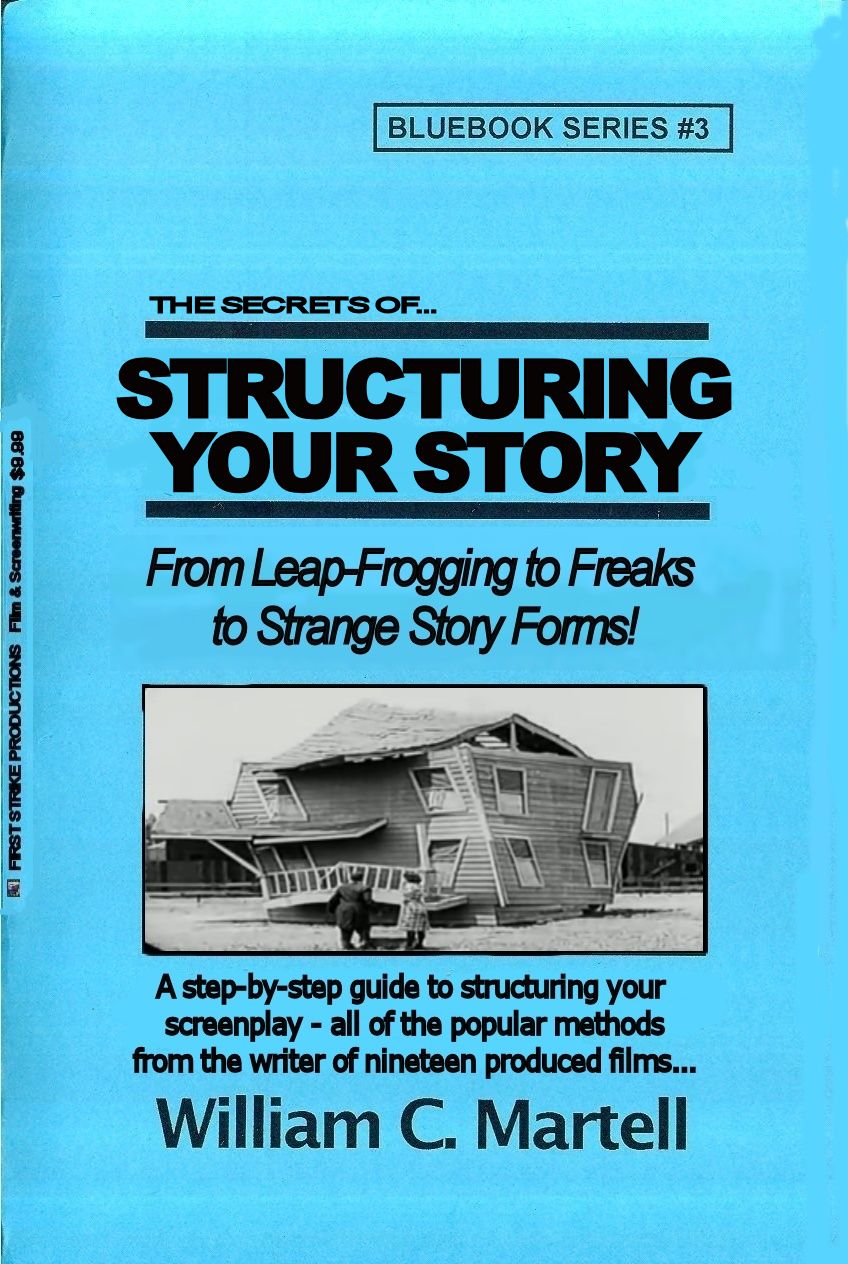
GOT STRUCTURE?!
*** STRUCTURING YOUR STORY *** - For Kindle!
William Goldman says the most important single element of any screenplay is structure. It’s the skeleton under the flesh and blood of your story. Without it, you have a spineless, formless, mess... a slug! How do you make sure your structure is strong enough to support your story? How do you prevent your story from becoming a slug? This Blue Book explores different types of popular structures from the basic three act structure to more obscure methods like leap-frogging. We also look at structure as a verb as well as a noun, and techniques for structuring your story for maximum emotional impact. Most of the other books just look at *structure* and ignore the art of *structuring* your story. Techniques to make your story a page turner... instead of a slug!
Only $4.99 - and no postage!

STORY: WELL TOLD!
*** STORY: WELL TOLD *** - For Kindle!
This book takes you step-by-step through the construction of a story... and how to tell a story well, why Story always starts with character... but ISN'T character, Breaking Your Story, Irony, Planting Information, Evolving Story, Leaving No Dramatic Stone Unturned, The Three Greek Unities, The Importance Of Stakes, The Thematic Method, and how to create personal stories with blockbuster potential. Ready to tell a story?
Print version was 48 pages, Kindle version is over 85,000 words - 251 pages!
Only $4.99 - and no postage!

START STRONG!
*** HOOK 'EM IN TEN *** - For Kindle!
Your story doesn't get a second chance to make a great first impression, and this book shows you a
bunch of techniques on how to do that. From the 12 Basic Ways To Begin Your Story, to the 3 Stars Of
Your First Scene (at least one must be present) to World Building, Title Crawls, Backstory, Starting
Late, Teasers and Pre Title Sequences, Establishing Theme & Motifs (using GODFATHER PART 2), Five Critical
Elements, Setting Up The Rest Of The Story (with GODFATHER), and much more! With hundreds of examples
ranging from Oscar winners to classic films like CASABLANCA to some of my produced films (because
I know exactly why I wrote the scripts that way). Biggest Blue Book yet!
Print version was 48 pages, Kindle version is over 100,000 words - 312 pages!
Only $4.99 - and no postage!
NO KINDLE REQUIRED! Get the *free* app (any device, except your Mr. Coffee) on the order page on Amazon!
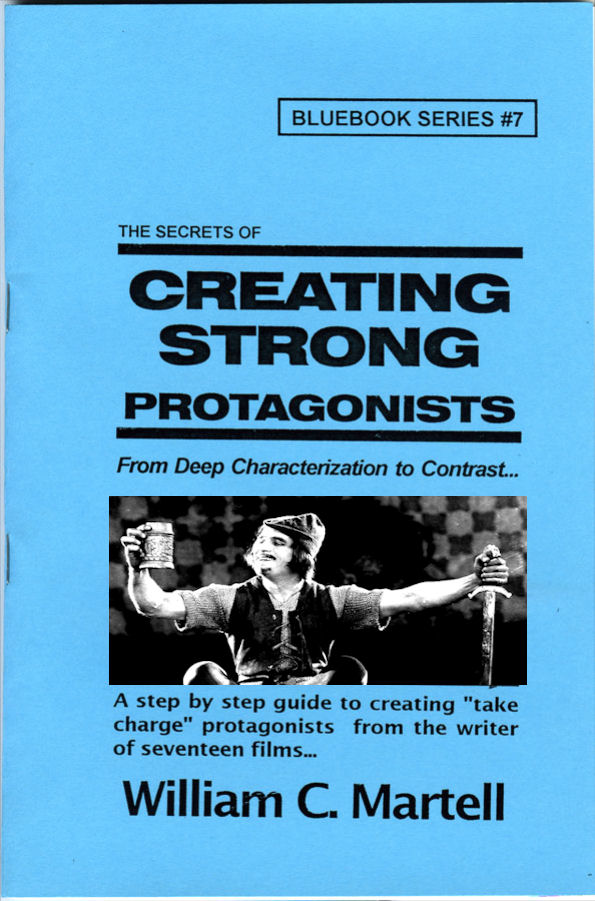
MOVIES ARE CHARACTERS!
*** CREATING STRONG PROTAGONISTS *** - For Kindle!
*** CREATING STRONG PROTAGONISTS *** - For Nook!
Expanded version with more ways to create interesting protagonists! A step-by-step guide to creating "take charge" protagonists. Screenplays are about characters in conflict... characters in emotional turmoil... Strong three dimensional protagonists who can find solutions to their problems in 110 pages. But how do you create characters like this? How do you turn words into flesh and blood? Character issues, Knowing Who Is The Boss, Tapping into YOUR fears, The Naked Character, Pulp Friction, Man With A Plan, Character Arcs, Avoiding Cliche People, Deep Characterization, Problem Protagonists, 12 Ways To Create Likable Protagonists (even if they are criminals), Active vs. Reactive, The Third Dimension In Character, Relationships, Ensemble Scripts, and much, much more. Print version is 48 pages, Kindle version is once again around 205 pages!
ONLY $4.99 - and no postage!
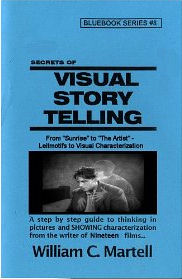
I WRITE PICTURES!
*** VISUAL STORYTELLING *** - For Kindle! (exclusive)
Show Don't Tell - but *how* do you do that? Here are techniques to tell stories visually! Using Oscar Winning Films and Oscar Nominated Films as our primary examples: from the first Best Picture Winner "Sunrise" (1927) to the Oscar Nominated "The Artist" (which takes place in 1927) with stops along the way Pixar's "Up" and Best Original Screenplay Winner "Breaking Away" (a small indie style drama - told visually) as well as "Witness" and other Oscar Winners as examples... plus RISE OF THE PLANET OF THE APES. Print version is 48 pages, Kindle version is over 200 pages!
ONLY $4.99 - and no postage!
DESCRIPTION & VOICE Blue Book!
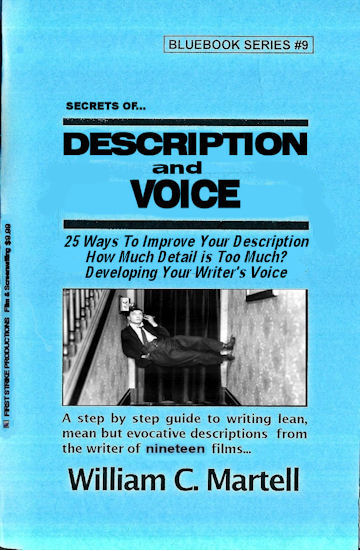
DESCRIPTION & VOICE Blue Book.
IS HALF OF YOUR STORY IN TROUBLE?
Most screenplays are about a 50/50 split between dialogue and description - which means your description is just as important as your dialogue. It just gets less press because the audience never sees it, the same reason why screenwriters get less press than movie stars. But your story will never get to the audience until readers and development executives read your script... so it is a very important factor. Until the movie is made the screenplay is the movie and must be just as exciting as the movie. So how do you make your screenplay exciting to read? Description is important in a novel as well, and the “audience” does read it... how do we write riveting description?
Only $4.99 and no postage!

PRO DIALOGUE TECHNIQUES!
*** DIALOGUE SECRETS *** - For Kindle!
***
Expanded version with more ways to create interesting dialogue! How to remove bad dialogue (and what *is* bad dialogue), First Hand Dialogue, Awful Exposition, Realism, 50 Professional Dialogue Techniques you can use *today*, Subtext, Subtitles, Humor, Sizzling Banter, *Anti-Dialogue*, Speeches, and more. Tools you can use to make your dialogue sizzle! Special sections that use dialogue examples from movies as diverse as "Bringing Up Baby", "Psycho", "Double Indemnity", "Notorious", the Oscar nominated "You Can Count On Me", "His Girl Friday", and many more! Print version is 48 pages, Kindle version is over 175 pages!
Only $4.99 - and no postage!

WHAT IS A SCENE?
*** SCENE SECRETS *** - For Kindle!
***
What is a scene and how many you will need? The difference between scenes and sluglines. Put your scenes on trial for their lives! Using "Jaws" we'll look at beats within a scene. Scene DNA. Creating set pieces and high concept scenes. A famous director talks about creating memorable scenes. 12 ways to create new scenes. Creating unexpected scenes. Use dramatic tension to supercharge your scenes. Plants and payoffs in scenes. Plus transitions and buttons and the all important "flow"... and more! Over 65,000 words! Print version was 48 pages, Kindle version is around 210 pages!
Only $4.99 - and no postage!
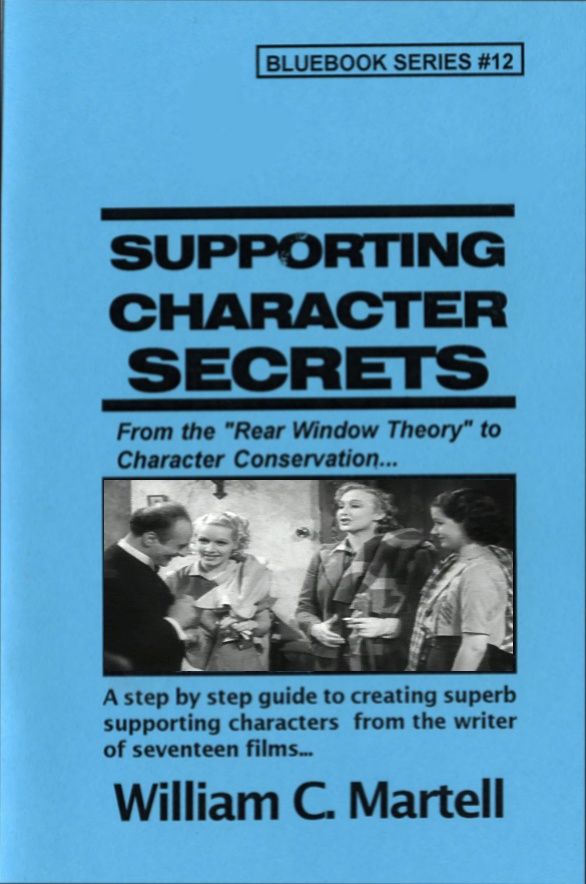
SUBPLOTS?
*** SUPPORTING CHARACTER SECRETS *** - For Kindle! (Exclusive)
Expanded version with more techniques to flesh out your Supporting Characters and make them individuals. Using the hit movie BRIDESMAIDS as well as other comedies like THE HANGOVER and TED and HIGH FIDELITY and
40 YEAR OLD VIRGIN and many other examples we look at ways to make your Supporting Characters come alive on the page.
Print version was 48 pages, Kindle version is around 170 pages!
ONLY $4.99 - and no postage!
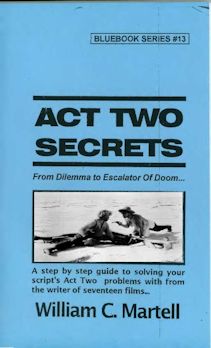
ACT TWO SOLUTIONS!
*** ACT TWO SECRETS *** - For Kindle!
Expanded version with more techniques to help you through the desert of Act Two! Subjects Include: What Is Act Two? Inside Moves, The 2 Ps: Purpose & Pacing, The 4Ds: Dilemma, Denial, Drama and Decision, Momentum, the Two Act Twos, Subplot Prisms, Deadlines, Drive, Levels Of Conflict, Escalation, When Act Two Begins and When Act Two Ends, Scene Order, Bite Sized Pieces, Common Act Two Issues, Plot Devices For Act Two, and dozens of others. Over 67,000 words (that’s well over 200 pages) of tools and techniques to get you through the desert of Act Two alive!
Print version was 48 pages, Kindle version is well over 200 pages!
ONLY $4.99 - and no postage!
READY TO BREAK IN?
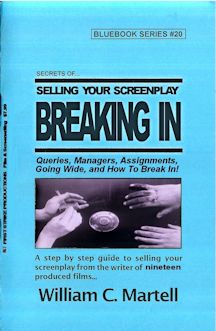
THE BUISINESS SIDE
*** BREAKING IN BLUE BOOK *** - For Kindle!
Should really be called the BUSINESS BLUE BOOK because it covers almost everything you will need to
know for your screenwriting career: from thinking like a producer and learning to speak their language,
to query letters and finding a manager or agent, to making connections (at home and in Hollywood) and
networking, to the different kinds of meetings you are will have at Studios, to the difference between
a producer and a studio, to landing an assignment at that meeting and what is required of you when you
are working under contract, to contracts and options and lawyers and... when to run from a deal!
Information you can use *now* to move your career forward! It's all here in the Biggest Blue Book yet!
Print version was 48 pages, Kindle version is over 400 pages!
$4.99 - and no postage!

STORY IN ACTION SERIES!

THE MISSION IMPOSSIBLE MOVIES
NEW: Updates On Films 7 & 8 Casting!
All Six Movies analyzed! All of the mission tapes, all of the “that’s impossible!” set pieces and stunts, the cons and capers - and how these scenes work, the twists and double crosses, the tension and suspense (and how to generate it), the concept of each film as a stand alone with a different director calling the shots (broken in the sixth film), the gadgets, the masks, the stories, the co-stars and team members (one team member has been in every film), the stunts Tom Cruise actually did (and the ones he didn’t), and so much more! Over 120,000 words of fun info!
THE MISSION IMPOSSIBLE MOVIES - 347 Pages - Only $3.99 !

BRAND NEW!
*** THE BOURNE MOVIES
NEW: Updates on TREADSTONE TV show!
All five "Bourne" movies (including "Legacy" and it's potential sequels) - what are the techniques used to keep the characters and scenes exciting and involving? Reinventing the thriller genre...
or following the "formula"? Five films - each with an interesting experiment! A detailed analysis of each
of the films, the way these thrillers work... as well as a complete list of box office and critical
statistics for each film. This book is great for writers, directors, and just fans of the series.
Only $3.99 - and no postage!
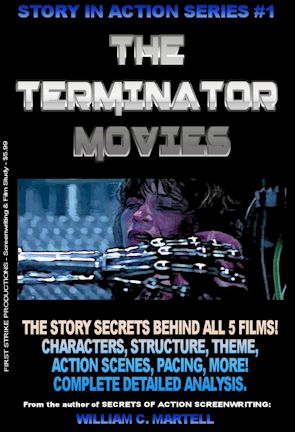
Over 240 pages!
*** THE TERMINATOR MOVIES *** - For Kindle!
He's back! The release of "Terminator: Dark Fate" is set to begin a new trilogy in
the Terminator story... 35 years after the first film was released. What draws us to these films about
a cybernetic organism from the future sent back in time? Why is there a new proposed trilogy every few
years? This book looks at all five Terminator movies from a story standpoint - what makes them work
(or not)? What are the techniques used to keep the characters and scenes exciting and involving? How
about those secret story details you may not have noticed? Containing a detailed analysis of each of
the five films so far, this book delves into the way these stories work... as well as a complete list of
box office and critical statistics for each film. This book is great for writers, directors, and just
fans of the series.
ONLY $3.99 - and no postage!
HITCHCOCK FOR WRITERS!
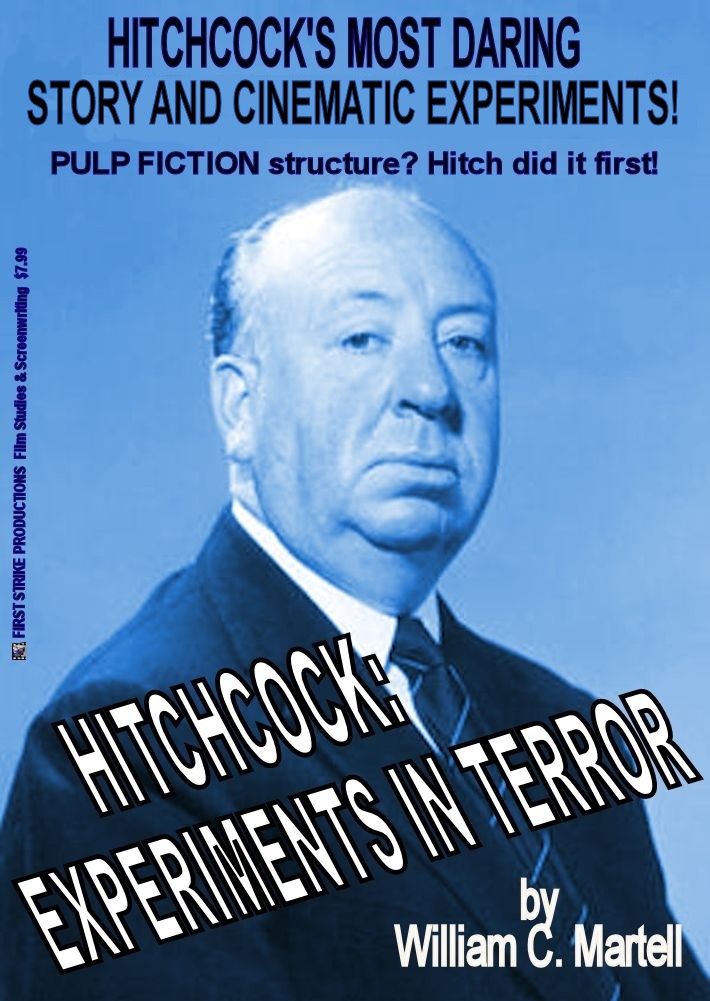
Strange Structures!
*** HITCHCOCK: EXPERIMENTS IN TERROR! *** - For Kindle!
***
Contained Thrillers like "Buried"? Serial Protagonists like "Place Beyond The Pines"? Multiple Connecting Stories like "Pulp Fiction"? Same Story Multiple Times like "Run, Lola, Run"?
HITCHCOCK DID IT FIRST!
This book focuses on 18 of Hitchcock's 52 films with wild cinema and story experiments which paved the way for modern films. Almost one hundred different experiments that you may think are recent cinema or story inventions... but some date back to Hitchcock's *silent* films! We'll examine these experiments and how they work. Great for film makers, screenwriters, film fans, producers and directors.
Only $5.99 - and no postage!
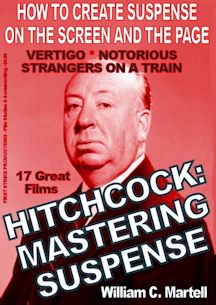
LEARN SUSPENSE FROM THE MASTER!
*** HITCHCOCK: MASTERING SUSPENSE *** - For Kindle!
Alfred Hitchcock, who directed 52 movies, was known as the *Master Of Suspense*; but what exactly is suspense and how can *we* master it? How does suspense work? How can *we* create “Hitchcockian” suspense scenes in our screenplays, novels, stories and films?
This book uses seventeen of Hitchcock’s films to show the difference between suspense and surprise, how to use “focus objects” to create suspense, the 20 iconic suspense scenes and situations, how plot twists work, using secrets for suspense, how to use Dread (the cousin of suspense) in horror stories, and dozens of other amazing storytelling lessons. From classics like “Strangers On A Train” and “The Birds” and “Vertigo” and “To Catch A Thief” to older films from the British period like “The 39 Steps” and “The Man Who Knew Too Much” to his hits from the silent era like “The Lodger” (about Jack The Ripper), we’ll look at all of the techniques to create suspense!
Only $5.99
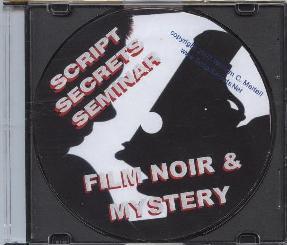
AUDIO CLASS!
NOIR & MYSTERY80 minute MP3 packed with information on writing Film Noir and Mystery scripts. Using examples from CHINATOWN to OUT OF THE PAST to DOUBLE INDEMNITY you'll learn how to create stories in this dark, twisted genre. How to plant clues, red herrings, suspects, victims, spider women, fallen heroes, the funhouse mirror world of noir supporting characters... and the origins of Film Noir in literature Noir dialogue and how noir endings are different than any other genre. All of the critical elements necessary to write in this critically popular genre.
The Noir & Mystery Class is only $15 (plus $5 S&H). First 20 on Limited Black Disk!
PAMDEMIC SALE! $5 OFF!
IDEAS AND CREATIVITY - 80 minute MP3 packed with information. Tools to find ideas that are both personal *and* commercial. Hollywood wants scripts with High Concept stories... but not stupid scripts. Developing *intelligent* high concept ideas. How to turn your personal story into a blockbuster - or find your personal story in a high concept idea. Brainstorming and being creative. Ideas and Creativity is $10.00 (plus $5 S&H)
WRITING INDIES - Writing an Indie film? This class covers everything you need to know - from Central Locations to Confined Cameos. Using examples from SWINGERS, THE COOLER, STATION AGENT and others, this 80 minute MP3 is packed with information. How Indoe films challenge the audience (while mainstream films reassure the audience). Structures, using BOYS DON'T CRY, RUN LOLA RUN, HILARY & JACKIE, and others as example. Writing for a budget, writing for non-actors, getting the most production value out of your budget. Writing Indies is $10.00 (plus $5 S&H)
WRITING HORROR - The essentials of a horror screenplay - what do ROSEMARY'S BABY, NIGHT OF THE LIVING DEAD, THE EXORCIST, BRIDE OF FRANKENSTEIN, THE OTHERS and OPEN WATER have in common? This class will tell you! All of the critical elements necessary to write a script that scares the pants off the audience. Writing Horror is $10.00 (plus $5 S&H).
Click here for more information on CLASS MP3s!

Use your creative energy to focus on the content; let Final Draft take care of the style. Final Draft is the number-one selling application specifically designed for writing movie scripts, television episodics and stage plays. Its ease-of-use and time-saving features have attracted writers for almost two decades positioning Final Draft as the Professional Screenwriters Choice. Final Draft power users include Academy, Emmy and BAFTA award winning writers like Oliver Stone, Tom Hanks, Alan Ball, J.J. Abrams, James Cameron and more.
* * * Buy It!


